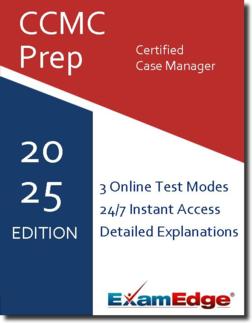CCMC Certified Case Manager (CCM) Practice Tests & Test Prep by Exam Edge - Test Reviews
Based on 37 Reviews
- Real Exam Simulation: Timed questions and matching content build comfort for your CCMC Certified Case Manager test day.
- Instant, 24/7 Access: Web-based CCMC Certified Case Manager practice exams with no software needed.
- Clear Explanations: Step-by-step answers and explanations for your CCMC exam to strengthen understanding.
- Boosted Confidence: Reduces anxiety and improves test-taking skills to ace your CCMC Certified Case Manager (CCM).

CCMC Certified Case Manager (CCM) Practice Tests & Test Prep by Exam Edge - Review
CCMC Certified Case Manager - Reviews
Excellent
Based on
185
reviews
See why our users from 154 countries love us for their exam prep! Including 37 reviews for the CCMC Certified Case Manager exam.
Exam Edge is an Industry Leader in Online Test Prep. We work with our Institutional Partners to offer a wide array of practice tests that will help you prepare for your big exam. No Matter how niche field of interest might be, were here to help you prepare for your test day.
| 2.8M | 4.5M | |
| Users | Tests Taken | |
| 100K | 19 | |
| Unique Exams | Years in Business | |


